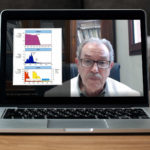Doctor Larraga dispels misinformation regarding coronavirus vaccines
Vicente Larraga, research professor at the Vaccines and Gene Expression Unit of CSIC Biological Research Center, participated in a videoconference for BBVA employees, where he answered their questions about current vaccines against COVID-19. Larraga is a doctor and honorary professor of research at the Margarita Salas Biological Research Center and has been a member of the jury for the BBVA Foundation's Frontiers of Knowledge awards.

Doctor Larraga began his speech by explaining the history of pandemics in the modern world and how they have evolved from when the first vaccine was created up until the vaccines recently approved to fight the coronavirus. As the Director of the Molecular Parasitology Group, Larraga and his team recently developed a vaccine for canine leishmaniasis and are searching for a recombinant DNA immunization system to fight the SARS-CoV-2 virus.
Should I get vaccinated?
Larraga took a few questions from the employees. First, he answered the questions related to the type of people who can receive the current vaccines. "The vaccines are for the entire population, although there may be exceptions depending on each person's circumstances," he said, specifying that people with previous pathologies should be specifically analyzed.

Vicente Larraga during the conference - BBVA
In his opinion, groups that face less risk such as young people should also be vaccinated, since "there are quite a few people in the 20 to 40 years old segment who get sick and die, or suffer serious consequences, so they should be vaccinated. As for pregnant women, the doctor said this is a group that "is never included in vaccination groups," nor are minors.
Vaccines’ effectiveness
Larraga said he trusted the vaccines that are currently being distributed. "It is very, very unlikely that people who are vaccinated will get the disease. Most vaccines are 95% effective," he said. He also explained that while it has not been proven that a vaccinated person can spread the virus, "it can happen, although the infection would be weaker. On this point he wanted to clarify that the cases of infection observed in patients vaccinated in the first dose were due to the fact that they were already infected before that first vaccination and not because of a new infection. In these cases, the vaccine will make the disease much less severe.
One of the most worrisome concerns is whether the vaccine will mean the end of the virus. "Of course, the vaccine is the solution," he stressed. "When a vaccine is introduced massively, the disease drops in a very noticeable way. The pandemic will end thanks to the vaccines," he adds, clarifying that there will continue to be limited cases until the disease is eradicated, something that will take more time. For this to happen, in his point of view, we will probably have to be vaccinated periodically over the next two or three years at least, "until the virus loses its aggressiveness and forms part of the cohort of respiratory viruses, as happened ten years ago with the avian flu.”
He also expressed his confidence when asked about how quickly the vaccine was developed and the uncertainty that this can raise. The doctor says this speed was made possible thanks to international scientific collaboration: "In January the whole sequence of the virus' genes was already available, and this has helped us go faster. The clinical trial phases have almost overlapped, which has accelerated the development a lot." Larraga pointed out two factors that he considers decisive in this success: on the one hand, the technologies used were already being used before and, on the other, safety has been ensured throughout every phase.